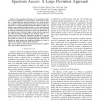Free Online Productivity Tools
i2Speak
i2Symbol
i2OCR
iTex2Img
iWeb2Print
iWeb2Shot
i2Type
iPdf2Split
iPdf2Merge
i2Bopomofo
i2Arabic
i2Style
i2Image
i2PDF
iLatex2Rtf
Sci2ools
INFOCOM
2010
IEEE
2010
IEEE
Queuing Analysis in Multichannel Cognitive Spectrum Access: A Large Deviation Approach
Abstract—The queueing performance of a (secondary) cognitive user is investigated for a hierarchical network where there are N independent and identical primary users. Each primary user employs a slotted transmission protocol, and its channel usage forms a two-state (busy,idle) discrete-time Markov chain. The cognitive user employs the optimal policy to select which channel to sense (and use if found idle) at each slot. In the framework of effective bandwidths, the stationary queue tail distribution of the cognitive user is estimated using a large deviation approach for which closed-form expressions are obtained when N = 2. Upper and lower bounds are obtained for the general N primary user network. For positively correlated primary transmissions, the bounds are shown to be asymptotically tight. Monte Carlo simulations using importance sampling techniques are used to validate the obtained large deviation estimates.
| Added | 28 Jan 2011 |
| Updated | 28 Jan 2011 |
| Type | Journal |
| Year | 2010 |
| Where | INFOCOM |
| Authors | Amine Laourine, Shiyao Chen, Lang Tong |
Comments (0)

